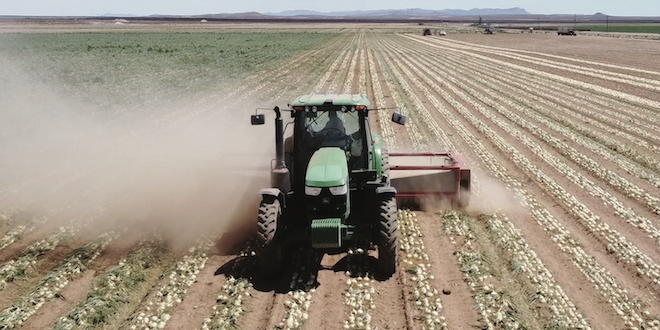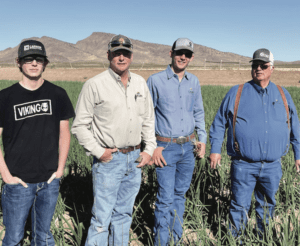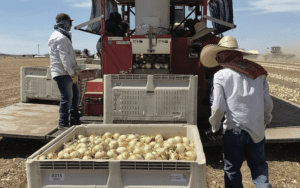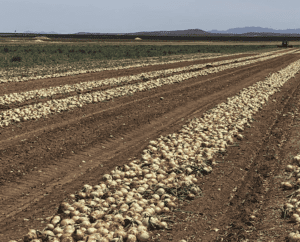

May 6, 2022Technology, tradition help Carzalia Valley Produce thrive
Farming in the high desert of New Mexico only feet from the U.S.-Mexico border, Carzalia Valley Produce Inc. embraces new technology to change and improve its operations and grow onions sustainably.
Family involvement is also important at Carzalia, a subsidiary of the 104-year-old W.R. Johnson & Sons, based in Columbus, New Mexico. In the southwest part of New Mexico, Carzalia farms 3,000 acres with pima upland cotton and onions the majority of production.


Farmed by the family’s fourth and fifth generations, the Johnsons enthusiastically adopt environmentally friendly ways of farming, including using technology to raise crops that consume less water and use fewer inputs.
From mid-May to mid-August, Carzalia harvests red, white, yellow and sweet short day and intermediate fresh onions. William Ralph Johnson II, who died in 2002, worked with New Mexico State University breeders to develop an intermediate sweet onion. While most sweet onions are short day onions, the Carzalia Sweet, an intermediate introduced in 1982, allows the Johnsons to extend their sweet onion harvesting from one month to almost three months.


Sweet harvest
“Our environment and cultural practices increase the sugars, making it sweet,” said James Johnson, vice president, and William Ralph Johnson II’s grandson.
The Carzalia Sweet hits the market when other non-storage sweet onions aren’t typically available. Historically, it follows the Texas 1015 and Vidalia but ships before Walla Wallas.
Low pyruvic acid makes for Carzalia Sweet’s mild flavor. “You can have a mild onion that’s not sweet and you can have a sweet onion that’s not mild,” said Johnson. “The best thing you can do is get the combination of the two, which is a mild sweet onion. That’s why we work so hard at developing and selecting for a mild sweet onion.”
Carzalia plants a breeder nursery and hosts extensive onion variety trials for Crookham Co., a Caldwell, Idaho, seed company, and sells seeds.
“Just as we have to talk with our customers and find out and understand what they are looking for, it’s important to work with good seed companies and build on that relationship and understanding,” said Johnson.
Regenerative course
The Johnsons are promoters of regenerative agriculture, a system of growing similar to conservation agriculture that instead of tilling uses cover crops, animal grazing, diversified crops and hedgerows to reduce soil disturbance and chemical use.
In 2020, Carzalia converted to all regenerative farming, which allows Carzalia to test instead of guessing its crops’ nutritional needs. “The improvement in the end product is important to us,” said Johnson. “For us, it’s more about looking at every application and the effect it has on the total ecology, which includes the microbiome of the soil, the ecology of the wildlife and the overall soil quality.”
To more efficiently use water, Carzalia uses new tools and methods, including satellite imagery and soil moisture sensors, to examine and correlate leaf temperatures. With an inch of applied water costing $10, any savings multiplied across large acreage helps keep a lid on escalating farm costs, said Johnson.
“You don’t have to go very far in any direction in the West,” he said. “West of the Mississippi, it seems like moisture and water are the most important things for all of us.”
Previously relying on furrow irrigation, Carzalia in 1999 transitioned to subsurface drip irrigation. Watching a neighbor’s adoption of the technology prompted the Johnsons to increase its drip irrigation which today waters all crops.


Slashing inputs
The Johnsons monitor plant nutrition via sap analysis. Leaf samples are analyzed through data points that balance plant nitrogen use and help reduce inputs.
The first year, Carzalia consumed 60% of its normal nitrogen volume and dropped to 50% the second. This year, it is looking at applying only 25%. The farm hasn’t applied phosphate since 2019.
“The rising and skyrocketing costs of phosphorus fertilizers haven’t affected us,” said Johnson. “Since we have been doing this and balancing our nutrition in plants, we have gone two entire crop seasons with no applied insecticides or fungicides. We’re talking hundreds of thousands of dollars in savings.”
For two years, Carzalia has been beta testing onion laser weeding technology. It cooperates with Carbon Robotics in development of an autonomous weeder.
“It’s been fantastic to watch the technology grow, to watch an engineering team that had no agricultural background pour their entire collective education and knowledge into improving soil and plant health,” said Johnson. “We had
a front seat in the development and passion that came from it. These guys are trying to do better for the world.”


Organic venture
In 2021, the Johnsons decided they could convert some of their farm to organic. Because some ground laid fallow for several years, it was immediately certified as organic.
About 10% of Carzalia’s acreage is organic with onions and cotton accounting for the bulk of acreage. In 2022, the Johnsons plan to harvest their first organic onion crop.
“We want to improve on the concept and then ramp up as quickly as we can,” said Johnson. “The problem is, most of the damage done to the soil was not done overnight and can’t be fixed overnight. It’s a process. We have to pay our dues to get more of the ground certified organic.”
Machines harvest 80% of Carzalia’s onions. In the packing shed, Carzalia this past season was always short by 20 workers. New packing equipment helped ease the labor shortfall.
Soaring input costs and unable to control powdery mildew, Carzalia in 2011 discontinued growing pumpkins and watermelons, focusing on cotton and onions.
“The pumpkin and watermelon business is cutthroat,” said Johnson. “A lot of people are willing to do it at break even pricing. We were not willing to do that anymore, not for the risk.”
In terms of inputs and risk, onions are Carzalia’s most expensive crop. An acre of onions can exceed $10,000 compared to $1,000 for an acre of cotton.
“It’s just an intense and high amount of money needed to get onions to that point,” said Johnson. “Cash flows are harder on onions compared to most row crops.”
Machine harvesting helps paprika harvesting efficiencies. However, a barrage of lower-priced imports challenges growers, said Johnson.
Desert risks
Despite myths, farming along the U.S.-Mexican border isn’t much different from other farming, except onion fields along the border wall are surveilled 24 hours a day by the U.S. Border Patrol.
“Border farming has had its challenges in the past,” said Johnson. “Living here 104 years, a lot has happened. There’s no fear living on the border.”
The Johnsons still cross the border to eat lunch. While illegal crossings in the immediate area are low, one doesn’t have to go far to see many.
“While there have been issues in the past, currently, for us, it’s been pretty calm,” said Johnson. “Where we are is really intense with border patrol technology. When outsiders come in, they sometimes want to make it a little more Wild West than it is.”
Immigrating from Wales and Ireland, the Johnsons’ forebears settled in Virginia in the 1700s. In 1918, shortly after New Mexico had gained statehood, cattleman W. R. Johnson Sr., James’ great-grandfather, moved from the San Antonio, Texas, area, to Columbus, which Pancho Villa raided and burned two years prior. Johnson saw southern New Mexico’s beautiful Carzalia Valley possessing potential.
During a 1950 drought, the Johnsons were approached about growing tomatoes for canning, if water could be located. To save the ranch, the Johnsons sold part of it to develop into farmland. Water was discovered in 1951.
Family heritage
William Ralph Johnson III, “Big Bill,” is president and father of James and Bill “Little Bill” Johnson. Bill is treasurer and manages tree crops. James’ sons, Taylor and Walker, assist the company’s agronomist. Both test tissue samples while Walker interns with Carbon Robotics.
“There has never been a Johnson son (and that includes cousins) who hasn’t come back to the farm,” said Johnson.
After attending college and realizing they weren’t cut out for academia, the fourth generation of Johnsons returned to the farm. Bill returned in 1989 while James came home in 1995.
“It’s funny because when I left home, I swore I wouldn’t come back. But after I got to school, all I could think about was how I wanted to be on the farm,” said James.
Making the next generation feel valued makes it easier for them to return to the farm.
“You have to give the next generation some responsibility and let them run with it,” said Johnson. “You can’t have the older generation micromanaging the younger. You have to let them spread their wings and start expressing themselves. Let them give some input and let them know their input matters. Make it so they don’t feel like hired hands, but feel like they’re a part of the process.”
Constantly adapting is key to future success.
“If anything, the last two years and this pandemic have proven tomorrow is not guaranteed,” said Johnson. “You have to be adaptable, like in bringing in the new generation into the farm and making them part of the operation. We always have to look at alternatives and adapt, to evolve and always be ready for the changes.”
— Doug Ohlemeier, assistant editor














